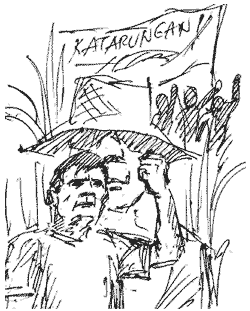
| Home | CPP | NPA | NDF | Ang Bayan | KR Online | Public Info | Publications | Kultura | Specials | Photos |

| |||||||||||||||||||||||
|
|
|
In times of extreme exploitation and oppression by the ruling classes, there is no stopping the outburst of creative art and literature portraying the people's resistance. Thus the surge of songs, poetry, videos and stories of witnesses to the river of blood that flowed and the outpouring of sympathy for the victims of the massacre in Hacienda Luisita. Pakikiramay (Condolences) is a joint publication of the Congress of Teachers and Educators for Nationalism and Democracy (CONTEND)-Alliance of Concerned Teachers (ACT) and the Amado V. Hernandez Resource Center (AVHRC). Edited by Joi Barrios, it contains poems from 25 of the most distinguished Filipino poets. The booklet Pakikiramay: Alay ng mga makata sa mga magsasaka ng Hacienda Luisita (Condolences: Poets' tribute to the peasants of Hacienda Luisita) was released promptly to condemn the murder of peasants in the hacienda in November 2004, and express the poets' solidarity with the life and struggle of the toiling masses. The poems are divided into categories. In the collection's introduction are "Serenata" (Concert) by Fidel Rillo and "Sa Hacienda Luisita" (In Hacienda Luisita) by Romulo P. Baquiran, Jr., which illustrate the justness of the peasants' struggle for land. In the section Poems of the funeral vigil are Rio Alma's "Paglalamay" (Keeping Vigil) and Bienvenido Lumbera's "Agunyas sa Hacienda Luisita" (An Ode to Hacienda Luisita): "Walang benditang tumigmak sa amoy-lupang bihis/ Ng mga welgistang humingi ng dagdag/ Sa 9.50 lingguhang kita./ Dugong pumulandit sa dagsa ng bala,/ Laway na tumalsik nang hatawin ng truncheon,/ Plemang idinahak ng panginoong maylupa." (There was no holy water to drench the soil-stenched clothes/ of strikers asking for a raise/ to their `9.50 weekly wage./ It was blood that spurted with the hail of bullets/ Spittle that spattered with the blow of truncheons/ Phlegm that was hawked out by the landlords). Mga tula ng tunggalian (Poems of conflict) feature V. E. Carmelo D. Nadera's "Kantang Kasamak" in Pilipino and Capampangan, Mila D. Aguilar's "Celebrasyon sa Masaker sa Hacienda Luisita" (Celebrating the Massacre in Hacienda Luisita), Duke Bagulaya's "Maanyag Kaupay an Gabi Dinhe Ha Nayon" (The Nights are Lovely Here in the Countryside) in Waray, Lilia Quindoza-Santiago's "Luisita, Luisita!", Rolando B. Tolentino's "Luha" (Tears), and others that bare the conflicting interests of the hacienda owners and the peasant masses.  Mga tula sa suliraning agraryo (Poems on the agrarian problem) illustrate the peasantry's centuries-old bondage. From Domingo G. Landicho's "Dugo sa Isinumpang Paraiso" (Blood in the Cursed Paradise), "Magsasaka: Tayo'y kay laong/ Iginapos ng lupain/ Ng panginoong maylupa/ Na bathala't batas natin/ Di ba't tayo'y nagpunla/ Tayo rin ang nagtanim/ Ano't nitong magapak na'y/ Asendero ang nagpiging?" (Peasants: For so long have we been/ Shackled to the land/ By the landlords/ Who are our gods and law/ Aren't we the ones who did the plowing/ Aren't we the ones who did the planting/ Why is it that after harvest/ It is the haciendero who feasts at the banquet?) The collection ends with Mga tula ng pagsusuri at pagsulong (Poems of analysis and advance). In this section are Jose Wendell Capili's "After Luisita on Aussie TV," Joi Barrios' "Diskurso ng Estado" (The State's Speech), Herminio S. Beltran's "Ibain Ko (Ikinahihiya Ko)" (It Shames Me) in Iloko and Danton Remoto's "Ang Magbubukid, Muli" (The Peasantry, Once More), among others. The cover design (Cesar Hernando and Jesse Allegre) completes Pakikiramay�. In front, the peasants are portrayed behind sugar cane stalks resembling the bars of a prison cell. At the back, the imagined cell is gone, symbolizing the peasantry's liberation. Pakikiramay� not just effectively illustrates the struggle at Hacienda Luisita, it also features the just struggle not only of the peasantry but of the entire people. 
| ||||||||
|
[ HOME | CPP | NPA |NDF | Ang Bayan | KR Online |Public Info] [Publications | Specials | Kultura | Photos] The Philippine Revolution Web Central is maintained by the Information Bureau of the Communist Party of the Philippines. Click here to send your feedback. |
|